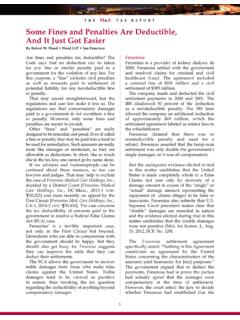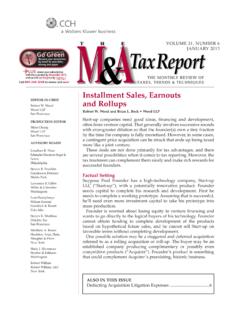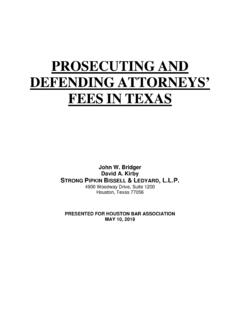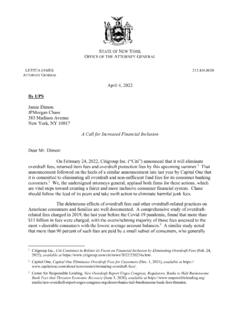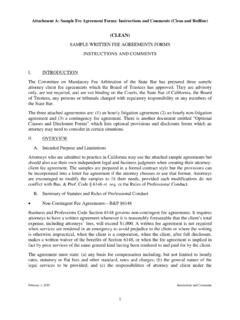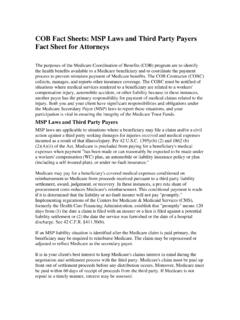Transcription of 12 Ways to Deduct Legal Fees Under New Tax Laws - Wood LLP
1 TAX NOTES FEDERAL, OCTOBER 7, 2019 111tax notes federalWOODCRAFT12 Ways to Deduct Legal fees Under New Tax Lawsby Robert W. WoodYou are a plaintiff in a lawsuit and just settled your case for $1 million. Your lawyer takes 40 percent, $400,000, leaving you the balance. You ask, what is your worst-case tax picture? Most plaintiffs would say worst case, they must pay tax on $600,000. But today you could pay tax on the full $1 , of course, you pay tax on $600,000 or even less, but that depends on what kind of case you have. The above-the-line deduction for employment, civil rights, and whistleblower Legal fees is still in the law and is more important than ever. Qualifying for it means that at most you are taxed on $600,000. But if you don t qualify, is there any other way to Deduct Legal fees ?Possibly, but one must be creative. Miscellaneous itemized deductions, the category Under which many plaintiffs historically deducted most Legal fees , are disallowed for 2018 through If you can t wait to settle your case until 2026, is there any tax relief in the meantime?
2 And what categories of plaintiffs and cases need to worry about these issues in the first place?I. Huh? Legal fees Are Income to Clients?Why even worry about ways to Deduct Legal fees ? Here is the background: Under Banks,2 plaintiffs in contingent fee cases must generally recognize gross income equal to 100 percent of their recoveries. Yes, even if the lawyer is paid directly, and even if the plaintiff receives only a net settlement after fees . This harsh tax rule usually means plaintiffs must figure a way to Deduct their 40 percent (or other) , Congress enacted an above-the-line deduction for employment claims, civil rights claims, and some whistleblower claims. Plaintiffs in employment and civil rights cases can still use this deduction for contingent fees , generally ensuring that they are taxed on their net recoveries, not their gross. Even so, some taxpayers and return preparers have trouble with the mechanics of claiming the deduction.
3 Moreover, a plaintiff s deduction for fees in employment, civil rights, and qualifying whistleblower cases cannot exceed the income the plaintiff received from the litigation in the same tax all the Legal fees are paid in the same tax year as the recovery (such as in a typical contingent fee case), that limit causes no problem. But what if the plaintiff has been paying Legal fees hourly over Robert W. Wood practices law with Wood LLP ( ) and is the author of Ta x a t i o n o f Damage Awards and Settlement Payments and other books available at this article, Wood details several options available to plaintiffs to avoid being taxed on their attorney fees despite the additional difficulties created by the Tax Cuts and Jobs discussion is not intended as Legal 2019 Robert W. Wood. All rights Cuts and Jobs Act, section 11045; see also Robert W. Wood, New Tax on Litigation Settlements, No Deduction for Legal fees , Ta x N o t e s, Mar.
4 5, 2018, p. v. Banks, 543 426 (2005). 2019 Tax Analysts. All rights reserved. Tax Analysts does not claim copyright in any public domain or third party more Tax Notes Federal content, please visit WOODCRAFT112 TAX NOTES FEDERAL, OCTOBER 7, 2019several years? In that event, there is no case income to offset, so the plaintiff can t Deduct the fees above the line. Several possible workarounds have been suggested, such as paying back the prior fees and having the lawyer charge them again in the year of the , none of these workarounds is reliable, so even in cases in which the availability of a deduction would appear to be clear-cut, some plaintiffs can end up unable to Deduct their Legal fees . Moreover, only employment, civil rights, and some types of whistleblower claims qualify for the above-the-line deduction. Some people fear (incorrectly) that employment cases based on contract disputes without discrimination might somehow not qualify.
5 In short, there is still considerable fear about who can Deduct Legal fees , and Physical Injury RecoveriesOnly relatively few plaintiffs are freed from worrying about deducting Legal fees . One safe ground is when a recovery is 100 percent tax free that is, in a pure physical injury case with no interest and no punitive damages. If the recovery is fully excludable from income, you cannot Deduct attorney fees , but you don t need to. But what if a case is partially taxable and partially tax free?Example 1: You are injured in a car crash. Thereafter, you collect $50,000 in compensatory damages and $5 million in punitive damages. The $50,000 is tax free, but the $5 million is fully taxable. What s more, you cannot Deduct your attorney fees . If you pay a 40 percent contingent fee, $2 million of that $5 million goes to the lawyer, with the client netting $3 million.
6 But the client must report the full $5 million. If the client cannot find a way to Deduct the fees , any taxable money is 100 percent taxable, even if 40 percent goes to the 2: Your case settles for $2 million and is 50 percent compensatory for physical injuries. The other 50 percent is for punitive damages. There is a 40 percent contingent fee, and it should generally be allocated 50-50 to the taxable and nontaxable damages. That means the client actually nets $ million. But the IRS divides the $2 million recovery in two, so the client is taxed on $1 million. The client cannot Deduct any of the $800,000 in Legal same kind of attorney fee tax problems can occur when there is interest instead of punitive damages. You might receive a tax-free settlement or judgment, but pre- or post-judgment interest is taxable, and you may not be able to Deduct the Legal fees on that part of the case.
7 Sometimes an allocation of Legal fees that is not strictly pro rata can help, but you need to document it, and the IRS may not the additional difficulties the 2017 tax reform legislation created for plaintiffs, there are still options for plaintiffs who would like to avoid being taxed on monies they didn t actually Unlawful discrimination recoveries Under some federal above-the-line deduction applies to attorney fees paid because of claims of unlawful discrimination. Unsurprisingly, the definition of an unlawful discrimination claim is complex. The first set of claims that qualify as claims for unlawful discrimination consists of claims brought Under these specific federal statutes: the Civil Rights Act of 1991; the Congressional Accountability Act of 1995; the National Labor Relations Act; the Fair Labor Standards Act of 1938; the Age Discrimination in Employment Act of 1967; the Rehabilitation Act of 1973; ERISA; the Education Amendments of 1972; the Employee Polygraph Protection Act of 1988; the Worker Adjustment and Retraining Notification Act; the Family and Medical Leave Act of 1993; chapter 43 of title 38 (concerning employment rights of uniformed service personnel); cases Under sections 1981, 1983, and 1985 of title 42; the Civil Rights Act of 1964; 2019 Tax Analysts.
8 All rights reserved. Tax Analysts does not claim copyright in any public domain or third party more Tax Notes Federal content, please visit WOODCRAFTTAX NOTES FEDERAL, OCTOBER 7, 2019 113 the Fair Housing Act; and the Americans With Disabilities Act of Whistleblower unlawful discrimination deduction also creates an above-the-line deduction for whistleblowers who were fired from their employment or retaliated against at work. But what about whistleblowers who expended Legal fees to obtain a qui tam award but weren t fired? Separately from the unlawful discrimination deduction, section 62 allows these qui tam plaintiffs to Deduct their attorney fees above the features about fees in non-employment whistleblower cases are noteworthy. Originally, the law for non-employment whistleblowers covered only federal False Claims Act cases.
9 In 2006 the above-the-line attorney fee deduction was expanded to include attorney fees paid by tax whistleblowers in cases brought Under section 7623 (regarding the detection of underpayments of tax, fraud, etc.). In 2018 it was extended to SEC and Commodities Futures Trading Commission whistleblowers. For False Claims Act recoveries, commencing with the 2018 tax year, the above-the-line deduction for attorney fees was extended to cover state whistleblower statutes as Catchall employment the most important item in this list is section 62(e)(18). This catchall provision makes a deduction available for claims alleged Under :any provision of federal, state or local law, or common law claims permitted Under federal, state or local law, that provides for the enforcement of civil rights, or regulates any aspect of the employment relationship, including claims for wages, compensation, or benefits, or prohibiting the discharge of an employee, discrimination against an employee, or any other form of retaliation or reprisal against an employee for asserting rights or taking other actions permitted by language seems quite broad but is arguably clear.
10 So far, there is little authority on this important provision. However, in LTR 200550004, the IRS concluded that attorney fees and costs rendered to obtain federal pension benefits fell within the catchall category. The case concerned a taxpayer who, after his retirement, discovered that he was being shortchanged on his pension. The IRS found unlawful , the IRS ruled that the case fell within the catchall category for unlawful discrimination even though the action was brought Under ERISA (one of the enumerated types of unlawful discrimination). Because only actions brought Under section 510 of ERISA are expressly allowed Under section 62(e), the catchall provision was needed to cover the taxpayer s case. This letter ruling suggests an expansive reading of the catchall category. So does the plain language of the Catchall civil rights catchall language in section 62(e)(18) also provides for the deduction of Legal fees to enforce civil rights.




